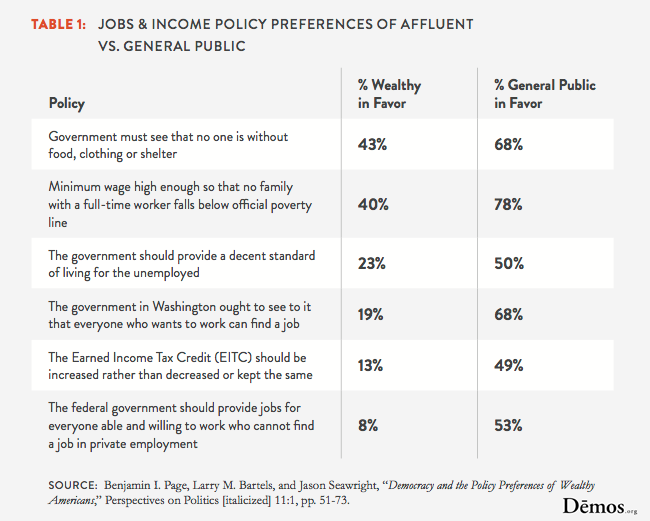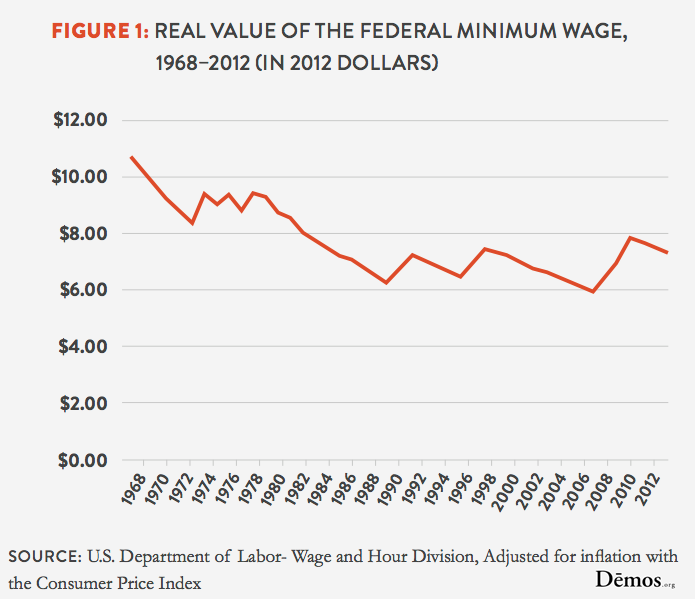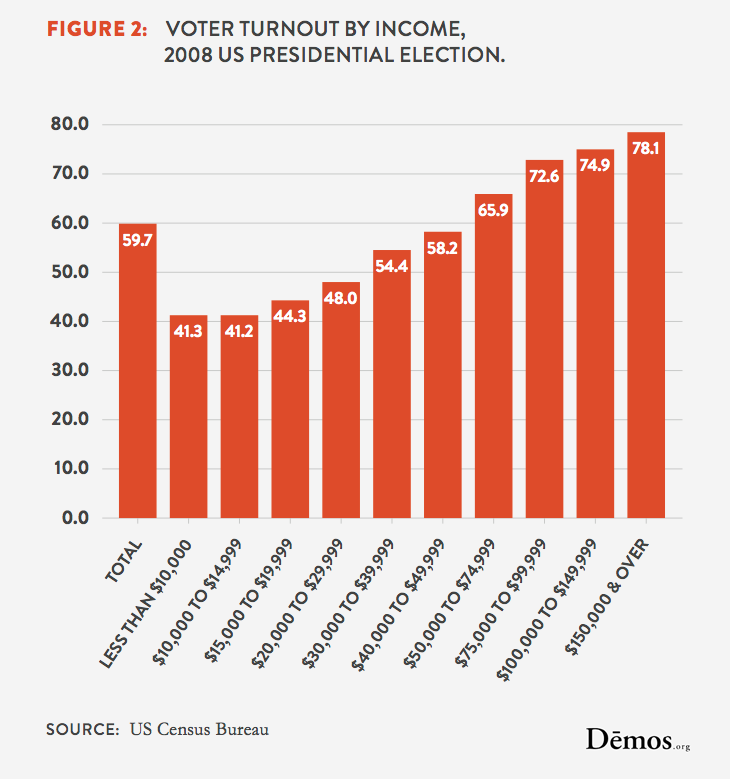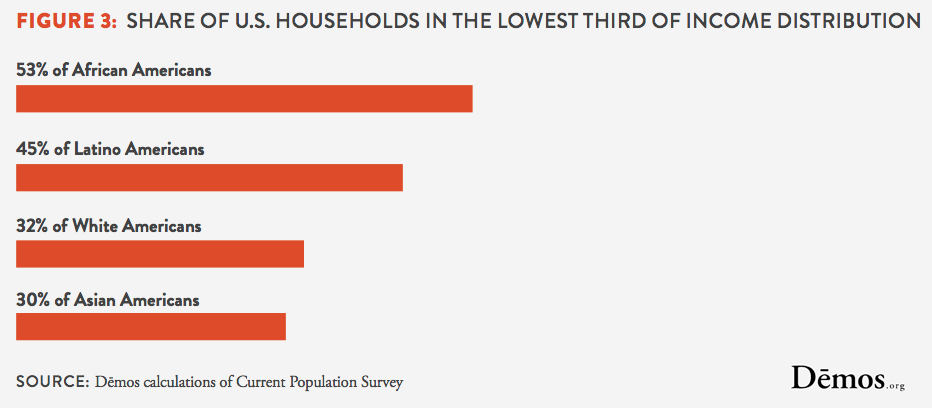Had to chop down the title to make it fit but I see that wealth disparity thread going on, and really in many ways it's about economic cleavages, and despite what people say it really is class warfare regarding most issues. It's a war of influence. So the wealth disparities between different races is as much tied to economic issues and influence as it is to anything else (including racism). Because anything that negatively impacts the middle class or the poor obviously impacts people of color to a greater extent.
If anyone wants to read it, the full report is actually a 42 page document, but also put it in web form.
Stacked Deck: How the Dominance of Politics by the Affluent & Business Undermines Economic Mobility in America | Demos
It breaks down into following categories to explain how political dominance by the affluent affects politics.
The Affluent Have Different Priorities

The Affluent Dont Prioritize Policies For Upward Mobility
The Priorities of Lower Income Americans Are Often Ignored or Blocked

The Affluent Participate More In Politics and Civic Life

The Affluent Have More Influence Over Policy Outcomes

The Affluent Have More Ways To Shape Politics
This is just common sense, PACs, lobbying and all that good shyt.
Political and Economic Inequality Are Mutually Reinforcing
Figured this would be somewhat helpful. I just copied and pasted key parts. You just can't talk economic inequality without talking about political inequality.
If anyone wants to read it, the full report is actually a 42 page document, but also put it in web form.
Stacked Deck: How the Dominance of Politics by the Affluent & Business Undermines Economic Mobility in America | Demos
It breaks down into following categories to explain how political dominance by the affluent affects politics.
The Affluent Have Different Priorities
For example, only 40 percent of the wealthy think the minimum wage should be high enough to prevent full-time workers from being in poverty while 78 percent of the general public holds this view.

The Affluent Dont Prioritize Policies For Upward Mobility
n New Jersey, for example, Governor Chris Christiewhom affluent voters supported by a 21-point margin when he won election in 2009spearheaded cuts to public education while simultaneously rolling back a surtax on the states wealthiest households. While Christie ran under the public financing program, he still raised $6 million, nearly half of which came from donations of $3,400, the states contribution limit. In 2011, the governor and New Jersey legislature locked in new tax cuts for businesses that cost $184 million in FY 2012, $374 million in FY 2013 and will total $2.35 billion over five years. On top of this, the state passed an additional $882 million in breaks for specific corporations. Since taking office, Christie has doled out over $1.57 billion in tax breaks.
Meanwhile, in 2010, Christie cut aid to school districts by $475 million and cut education aid by another $820 million in 2011. Christie cut New Jerseys public school districts funding so deeply that education advocates successfully sued the state for failing to meet minimum education standards. A judge ruled that the states funding formula underfunded schools by $1.6 billion over two years (nearly the same amount Christie has given away in corporate tax breaks) and that the burden of the cuts fell disproportionately on poorer districts.
The Priorities of Lower Income Americans Are Often Ignored or Blocked
More commonly, though, as documented by the research of political scientists Martin Gilens and Larry Bartels, the priorities of low-income Americans tend to be ignored by elected leaderseven when those priorities enjoy strong public backing.
Public support for raising the minimum wage is striking. A recent poll found that nearly three-quarters of likely voters (73 percent) support not just increasing the minimum wage to $10 in 2014 but also indexing it to inflation, which would result in automatic increases even absent congressional action. Another poll found seventy percent of likely voters supported raising the minimum wage to $10.38.

The Affluent Participate More In Politics and Civic Life

The imbalance in campaign contributions is even more skewed. Just 0.07 percent of the U.S. population made campaign donations of $2,500 or more in 2012 (as of December 1), yet this group had contributed a total of $1.4 billion to both presidential candidates. In contrast, the total haul from a much larger pool of donors contributing between $200-$2,500 was just $485.7 million. And, contributions from at least 3.7 million small donors who gave less than $200 to President Obama and Mitt Romney added up to just $313 million. Most donations also come from majority white, wealthy neighborhoods. Over 90 percent of donations come from majority white neighborhoods while only four, three and less than one percent came from Latino, African-American and Asian neighborhoods respectively.
The imbalance is even more pronounced when accounting for contributions to Super PACs. The Adelsons gave more to shape the 2012 federal elections than all the combined contributions from residents in 12 states: Alaska, Delaware, Idaho, Maine, Mississippi, Montana, New Hampshire, North Dakota, Rhode Island, South Dakota, Vermont, and West Virginia.
The Affluent Have More Influence Over Policy Outcomes
By comparing the policy preferences of different income groups with actual policy outcomes, he was able to determine how much influence different groups have had over policy. Gilens writes of his findings: The American government does respond to the publics preferences, but that responsiveness is strongly tilted toward the most affluent citizens. Indeed, under most circumstances, the preferences of the vast majority of Americans appear to have essentially no impact on which policies the government does or doesnt adopt.
The tilted scales of influence are especially significant given the impact of economic policy in the lives of different income groups and people of color. As the graph below shows, the majority of African Americans and nearly half of Latino Americans earn too little to impact their elected representatives

The Affluent Have More Ways To Shape Politics
This is just common sense, PACs, lobbying and all that good shyt.
Political and Economic Inequality Are Mutually Reinforcing
Growing economic inequality is typically blamed on structural changes in the economy, such as globalization. But it is becoming ever clearer that the tilted playing field of U.S. politics, with affluent voices speaking most loudly, is itself a driver of inequality. Most notably, successful lobbying efforts by wealthy interests to lower taxes on capital gains and dividends since the mid-1990sand then keep them lowhas exacerbated income inequality. Indeed, as a study by the Congressional Research Service found, looking at the period between 1996 and 2006, Changes in capital gains and dividends were the largest contributor to the increase in the overall income inequality between 1996 and 2006.
Figured this would be somewhat helpful. I just copied and pasted key parts. You just can't talk economic inequality without talking about political inequality.

 sohh instead of dropping $500 on J's, I use the money to lobby politicians. Then I can buy more J's, as a return on my investment...
sohh instead of dropping $500 on J's, I use the money to lobby politicians. Then I can buy more J's, as a return on my investment... People always exaggerate this stuff. But I was working this summer and one dude came in talking about negotiating his rent, but he had a brand new Ipad, I was like
People always exaggerate this stuff. But I was working this summer and one dude came in talking about negotiating his rent, but he had a brand new Ipad, I was like 